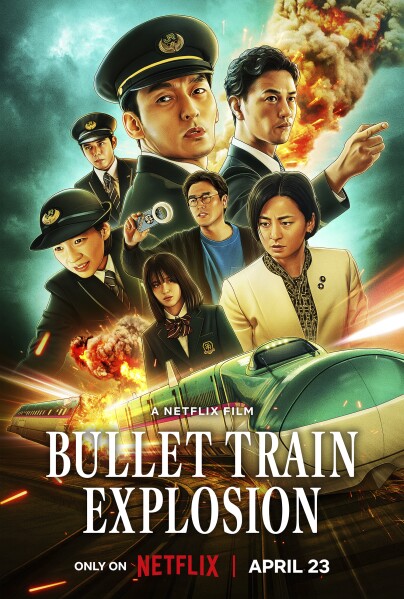BULLET TRAIN EXPLOSION (新幹線大爆破) (NETFLIX) (2025)
SYNOPSIS: An urgent phone call comes in to the bullet train general control center. The caller says that a bomb has been planted on the Hayabusa No. 60 bullet train heading toward Tokyo, and that it will explode as soon as its speed goes below 100 kilometers per hour. The criminal demands 100 billion yen in exchange for deactivating the bomb, forcing the railway workers into a desperate race against time as they struggle to prevent an explosion. Will the Hayabusa No. 60 be able to avert this disaster as it hurtles down the tracks?
MOVIE REVIEW:
We’ve not seen the classic 1975 Ken Takakura/ Sonny Chiba disaster movie on which this was based; but we suspect that many viewers wouldn’t have either. Still, familiarity is absolutely not necessary to enjoy this high-wire action thriller with a very simple premise at its core – what if there were not just one but several bombs planted on a Shinkansen, that would go off if its speed dropped below 100 kilometers per hour?
After reviving similar Japanese classics with ‘Shin Godzilla’ and ‘Shin Ultraman’, animator-turned-director Shinji Higuchi trains his sights on ‘The Bullet Train’, and largely pulls off a nail-biting masterclass in tension and suspense from start to finish. The train in question is a E5 Series Shinkansen running the Hayabusa 60 (5060B), bound from Shin-Aomori on Honshu island to Tokyo; and not long after it has departed, an anonymous caller phones into the JR East Headquarters to convey the threat, proving his or her seriousness by blowing up a freight train at Aomori-Higashi.
Right off the bat, it is clear that Higuchi intends for his movie to be as authentic as possible; and it is impressive to see what he has pulled off from his unprecedented access to JR East trains and facilities. From the trains themselves, to the control room of the JR East operations, and right down to the rolling stock centres, Higuchi makes use of each of these to give us an inside look at what contingencies and possibilities could arise should such a nightmare scenario indeed come to pass.
In turn, besides highlighting the best and worst of human behaviour during such crises, Higuchi also emphasises the professionalism, dedication and ingenuity of the JR East staff. That is primarily illustrated through Takaichi (Tsuyoshi Kusanagi), the head manager of the Hayabusa 60 on board the locomotive, and Kasagi (Takumi Sitoh), the general manager for JR East within the ops room. Together, they engineer three key points of intervention – first, to avoid a southbound train stalled at Morioka due to a bird strike; second, to mount a rescue attempt using another Shinkansen to link up with the 5060B from the rear; and third, to save the remaining passengers while avoiding the 5060B from reaching Tokyo Station and causing even more massive damage at the city centre.
Each of these are carefully choreographed set-pieces in and of themselves, switching between multiple points of view to give us a first-hand look at the players involved, the coordination needed and the stakes at risk. Within the control room, there is some shade thrown at government bureaucracy, represented by the presence of the advisor to the Prime Minister whose calculations are highly political; and on board the train, there is good use of a millionaire influencer Todoroki (Jun Kaname), who takes matters into his own hands when the Government refuses to crowdsource the ¥100 billion goal that the terrorist demands, as well as disgraced politician Kagami (Machiko Ono), who initially sees the occasion through her own political lens but eventually rises to the occasion as a leader.
We won’t spoil the surprise just who the caller is – suffice to say that if there is a weak link in the whole movie, this is probably it, because it does require a huge suspension of disbelief to think that someone like that could pull off such a stunt, even if said person had tutelage from a demolition expert. To be fair, Higushi and his screenwriters Kazuhiro Nakagawa and Norichika Ōba try their level best to make it convincing, but it is frankly a stretch that not even a Shinkansen travelling at that speed can overcome with confidence.
Still, as disaster thrillers go, ‘Bullet Train Explosion’ is a tense, thrilling affair that reminds you of the best of the genre. It offers the sort of edge of your seat action which defines such blockbusters, while keeping its focus on both the bureaucracy and humanity of the larger-than-life situation. At more than two hours, it could certainly be much tighter than it is, but the beauty of Netflix is you can pace yourself out if you do need an intermission; and even if it isn’t on the big screen per se, we dare say this is one of the biggest real-life Japanese movie you’ll get to see in recent memory..
MOVIE RATING:




Review by Gabriel Chong

